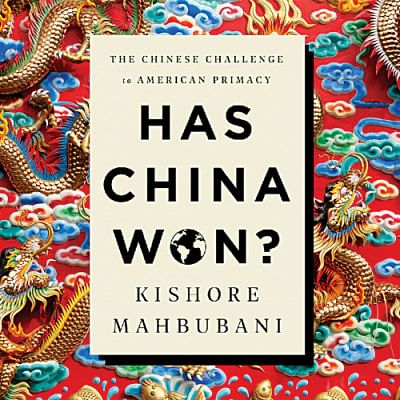When Empires Collide: China vs America

"It was the rise of Athens and the fear that this instilled in Sparta that made the war inevitable," Thucydides wrote in The History of the Peloponnesian War. Building on this historic context, American political scientist Graham Allison hypothesised the "Thucydides' Trap"—whenever the world's premier rising superpower bumps against the world's pre-existing superpower, ruinous war is almost certain. It has happened 16 times in the past 500 years. Much like the Romans could not avoid it against the Persians, nor the British against the Germans, it seems the geopolitical contest between US and China has also become unavoidable.
In Has China Won?: The Chinese Challenge to American Primacy (PublicAffairs, 2020), Kishore Mahbubani prognosticates about the near future as much as he emphasises the recent past in USA and China's geopolitical battle.
A career diplomat-turned-academic who represented Singapore in the UN, Mahbubani argues that American—or in a broader sense, Western—hopes and expectations as regards China were unceremoniously dashed because they were never shared by the Chinese to begin with. Americans always took it for granted that as China became more prosperous, it would become more Western. The author explains this more-or-less laissez-faire attitude of Washington towards Beijing up until the 2010s with recourse to the Modernization Theory, which prophesies that as a developing nation's middle-class surges, they will demand more political rights until democratic reforms become inevitable. Hence, as China lifted more than 800 million people above the extreme poverty line over the past 40 years—creating the world's largest middle-income population in the process—American policymakers complacently waited for the revolution to overthrow the Chinese Communist Party (CCP). Well, nothing of the sort transpired. Now Western sinologists are scratching their heads over why reality is not conforming to the textbook.
Mahbubani resolves the dilemma with his deep insight into the Chinese psyche, "Chinese culture values social harmony over individual empowerment. American culture is the opposite."
Indeed, over the 2,500-year history of the united China, it has mostly been ruled by a centralised authoritarian bureaucracy punctuated by a few brief inter-dynastic exceptions. Here, Mahbubani makes an interesting contrast between Western and Sinic political philosophy on the legitimacy of rule. In the Western mind set, a ruler can have legitimacy so long as it is predicated on the mandate of the people. And this mandate can only manifest itself through the ballot box. On the other hand, Confucian scholar Mencius wrote in the 3rd century BC that a ruler can also derive his mandate "from the heavens" through virtue and benevolence, something Enlightenment era thinkers like Bentham or Miller would laugh at.
But Mahbubani does not stop at the differences. He warns the West to exercise caution in their wish for a "Democratic China". Sure, democratic transition can embroil China in political and civil unrest; but it can also usher a populist Trumpian figure to power who might start asking for reparations from Britain for the ignominious opium wars, attack Japan as a retribution for the Nanjing massacre, or start messing with exchange rates that would spell disaster for the average American or European consumer. The technocrats over at CCP have ruled with a levelheadedness unmatched by their Western counterparts. Thus, Mahbubani suggests that the authoritarian regime at Beijing might be a blessing in disguise for the global order, ironic as it may seem.
Now, here we are. While America was busy getting mired in disastrous wars in the Middle East, China, unbeknownst to the world, overtook the US economy in a key figure of merit: purchasing power parity. And now it looks set to overtake USA in nominal GDP terms by 2025. How to deal with this new 'middle kingdom'?
This is where the book becomes engaging. US Army General H R McMaster expresses the American attitude succinctly, which Mahbubani quotes in his book: "At the end of the day, the struggle between America and China represents the struggle between 'free and open societies and closed authoritarian systems.'" And just like the Soviets, the Japanese or the Nazis before them, this new "authoritarian" challenger, i.e. China, barely stands a chance against America, the de facto torchbearer of Western civilisation. Except this time, as Mahbubani convincingly contends, the choice is not that straightforward. Burgeoning student debt, housing crisis, an ongoing opioid epidemic, a poor healthcare system, crumbling infrastructure—these are all tell-tale signs of an empire in decline. Even more striking is the yawning gap between public policy and public opinion. Mahbubani cites several credible research papers which document the broad convergence of opinion among academics that policymaking in US is largely dominated by an increasingly small economic elite while the average American has little to no say. And while self-correction is baked into democratic institutions, they do not have the leeway to make major U-turns in a short timeframe.
But China does. This unchecked executive power has drawbacks—the disastrous "one child" policy comes to mind—but it also means going from zero kilometres of 6-lane expressways to 150,000 kilometres in under 10 years. Furthermore, unlike the old and corrupt Soviet communist party, the CCP has devised an ingenious filtering mechanism which results in the best and the brightest minds running the country. So in this new "cold war", China has assumed the role of America—flexible, supple, and forward-thinking, while America acts increasingly like the Soviets—arrogant, myopic, and unbending. The role reversal is uniquely ironic.
The book, however, becomes disingenuously uncritical when it comes to evaluating the sins of the two empires. At the end of the day, Mahbubani is a diplomat, unwilling to ruffle too many feathers. Instead of carefully examining American war economics and how it holds US foreign policy hostage, he accepts the standard narrative that US repeatedly invades the Islamic world in order to liberate and modernise the oppressed. However, he politely suggests that America might be better off leaving the Islamic nations to their own devices and maybe modernisation will arise organically as a result.
In a similar fashion, he sidesteps any meaningful deliberation on the Uighur humanitarian crisis by claiming that any Chinese leader who shows weakness towards the Xinjiang separatist movement would lose his legitimacy to rule. Here, he wilfully conflates strong leadership with unmatched cruelty with an ease befitting a man who has been in rooms full of war criminals way too many times (incidentally, he often recounts with nostalgia his meetings with Henry Kissinger throughout the book). And his tone does not change either with regards to Tibet, Taiwan, or Hong Kong: whatever it takes to realise the dream of one united China is justified.
Has China Won ends on a positive note, I suspect because it has to. From combating climate change to realising UN developmental goals, the two largest economies of the world have no other recourse but to cooperate, the author reminds us. He firmly believes that the resolution of this Thucydidean conflict will not transpire in the military sphere since each party has access to enough nuclear warheads to destroy the other several times over, ending organised human existence in the process. For the sake of humanity, I hope he is right.
Yet, he overlooks one key aspect of the American psyche: its deep-seated belief in "American Exceptionalism". From its inception with the revolutionary war to contemporary times, America has only experienced steady rise through the ranks until it achieved full-spectrum dominance by the conclusion of the second world war. Americans truly view the world through a binary prism in which they are the "good" guys and those who go against them are invariably "bad".
What happens if they decide to channel this supreme righteousness against China?
Zihad Azad works as a research assistant at the BUET nanophotonic research group, with primary focus on plasmonic nanolasers.

 For all latest news, follow The Daily Star's Google News channel.
For all latest news, follow The Daily Star's Google News channel. 



Comments